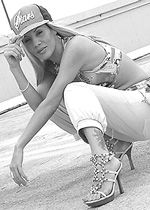Birth of Reggaeton – one music influencing another

If you never spoke Spanish, reggaeton music is guaranteed to make you bi-lingual.
Itâs presently the Caribbeanâs most popular selling music internationally and already has music producers Jay Z and P Piddy launching record labels dedicated to the sub-genre. {{more}}
So what really is reggaeton? Just like dancehall music, which came from the ghettos of Kingston, Jamaica, reggaeton emerged from the âbarriosâ (neighbourhoods) of San Juan, Puerto Rico.
Rythymically influenced by Jamaicaâs dancehall music, reggaeton was born in economically depressed Puerto Rican communities and existed for almost a decade before it exploded onto the international scene through a series of underground parties in the 90s.
Back then, deejays mixed up dancehall rhythms with Latin music, while rappers free-styled in Spanish rhymes. But to be politically correct, reggaeton artistes donât rap their lyrics in Spanish but in Boriquen. This is the Puerto Rican Spanish Creole with a similar tempo to Jamaican patois or broken English.
Ivy Queen who is the First Lady of reggaeton said, âThe music could not be heard in the clubs, it was very raw in the 90s but in 1995 the beat became more established and changed itâs name to reggaeton. My lyrics defend females and talk about women who are abused by boyfriends and their husbands. The music is real with feelings that people can relate to.â
Reggaeton was once highly disregarded by the elder folks in the 90s because of its ghetto roots, and gritty depiction of life in the âbarrioâ or ghetto where the music existed exclusively for several years. At one time the media and government attempted to curtail its popularity by creating anti-reggaeton policies, banning it from TV, radio and several retail outlets. Even people playing reggaeton in their cars would be stopped by the police and have the music confiscated.
Around this time, many artistes were in battles with Puerto Rican officials to defend the music which they said represented the youth, but they were ignored. Some of the more well known reggaeton artistes are Daddy Yankee, Don Omar, Tego Calderone and Ivy Queen.
Because of its tough and sometimes intimidating ghetto image, major music labels avoided the music but this spurred on independent labels. And today reggaeton is being blasted everywhere. It however remains evident that reggae dancehall has influenced reggatonâs development, some even call it Jamaican reggae with a hip-hop flavour from âborinquasâ.
So next time you hear a heavy dancehall rythym being sung in Espanol, bet your life you are being confronted with the latest international musical crave, reggaeton.









